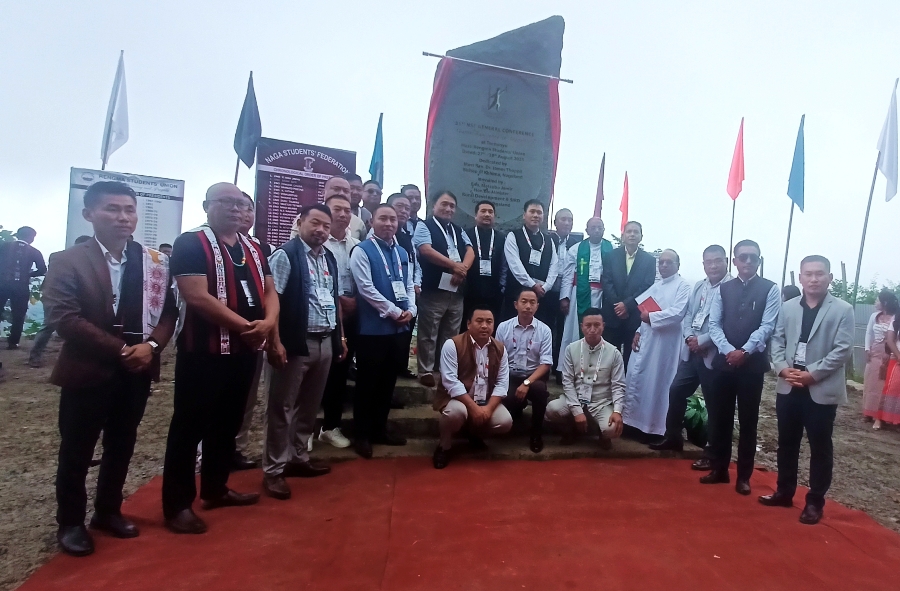Metsubo Jamir urges students at NSF conference to preserve Naga cultural identity, stressing unity, resilience, and education for progress.
Published on Aug 28, 2025
Share

TSEMINYU — Preserving cultural identity is not merely a nostalgic act but a necessity in today’s world, Minister for Rural Development and SIRD, Metsubo Jamir, said on Thursday while addressing students at the 31st Naga Students’ Federation (NSF) general conference.
The event, hosted by Rengma Students’ Union at RSA ground in Tseminyu, was inaugurated by Jamir, who underlined that the NSF has remained a steadfast pillar of unity over the decades despite geopolitical divisions and challenges, upholding the vision of a cohesive and inclusive Naga family.
Calling on students to remain alert and uncompromising in preserving Naga identity, Jamir said that cultural preservation provides emotional well-being, self-esteem, and a sense of belonging while guiding communities toward the future.
“For a society as diverse as the Nagas,” he added, “cultural identity creates social cohesion that transcends petty differences and strengthens intergenerational continuity. It serves as a compass in times of change and uncertainty.”
Jamir also expressed happiness at the revival of indigenous practices, mother tongues, and knowledge systems in recent years. Engaging in traditional practices and community initiatives, he said, helps strengthen resilience while allowing people to stay rooted and walk with pride anywhere in the world.
Also read: Chief Justice suggests scaling down Kohima High Court complex
Highlighting global technological changes, he said, “Education is no longer confined to textbooks and classrooms,” and that it must prepare youth to address challenges and contribute to an interconnected world.
Beyond academics, he noted, education should nurture critical thinking, empathy, intercultural understanding, and awareness of global issues such as poverty, inequality, climate change, and human rights.
He stressed that global education and cultural preservation are complementary, remarking: “One opens the mind, the other anchors the soul. Together, they empower individuals to walk forward in the world.”
Jamir reminded that Nagas have a unique history and identity, with much to offer the world. Values of community, respect for tradition, and resilience in adversity, he said, are lessons worth sharing globally.
He further called for student organisations, like the NSF, to promote exchanges and platforms for dialogue that build bridges between cultures and foster respect and peace. He urged students to move forward united in purpose, committed to progress, and inspired by the vision of a better world.
Jwenga Seb, MLA and Chairman of DPDB Tseminyu, in his address, described NSF as the conscience-keeper of Naga aspirations since its founding in 1947. He said that unity among Nagas does not mean uniformity, as their shared identity embraces many tribes, dialects, customs, and histories.
He also emphasised the values of interdependence and collective growth, stating that development must be inclusive and shared so that no community is left behind.
Read more: Naga Students’ Federation protest candidature of non-Naga for MBBS seat under state quota
Naga Students’ Federation seeks ILP cancellation for Assam eviction-hit persons
He urged students to use their unique position—rooted in tradition while connected to modern knowledge and technology—to build bridges across generations and institutions and to contribute to peace, dignity, and the strengthening of Naga identity.
Delivering the presidential address, Medovi Rhi paid tribute to the pioneers of NSF and said the federation was built on the principles of unity and the defence of political and cultural rights, a legacy now resting with the present generation. He recounted the federation’s stand against backdoor appointments, its advocacy for meritocracy, and its role in safeguarding indigenous rights.
Rhi reiterated that unchecked illegal immigration poses a threat to the Naga people and economy, adding that the NSF’s stand has never been against genuine citizens but against the loss of opportunities and dignity caused by illegal entry. He also cautioned that the most pressing threat to Naga unity is the pervasive disunity within the community, born of tribal rivalries, vested interests, personal ambitions, social disparities, and factions pulling us in every direction.
“We cannot allow this plethora of divisions, whether from internal rifts or external pressures, to derail our pursuit of sovereignty and progress,” he said. Failure, on the part of CSOs and Naga political groups, in showing the way forward, is a threat to the Naga future, he added.
The president emphasised the importance of practical-based learning that would unite the people, with a resilient and thriving Naga society becoming a reality.
Furthermore, Rhi called upon the people to rise above egos and divisions, standing in unity and brotherhood as truly unified Naga people beyond all borders.
Meanwhile, Samuel B Jyrwa, Chairman of the North East Students’ Organisation (NESO), in his greetings, highlighted substance abuse and illegal immigration as pressing issues in the region. He called upon the students and youth to take the lead in eradicating these problems.
Dozi Tana Tara, President of the All Arunachal Pradesh Students’ Union (AAPSU), extended solidarity with the Naga struggle for self-determination and emphasised joint action against illegal immigration.
Earlier, K Elu Ndang, convenor of the Central Organising Committee, said the theme ‘Resilience in Transition’ reflects the adaptability and unity of the Naga people as they navigate evolving social, cultural, and political landscapes.
The programme also featured cultural and musical presentations, unveiling of a monolith by Jamir, a green initiative, and a dedicatory prayer led by Rev. Dr. James Thoppil, Bishop of Kohima.
In the afternoon, the federal assembly was held, followed by a panel discussion on “Youth as the bridge to our political future.”